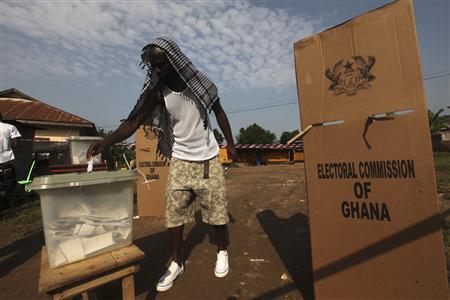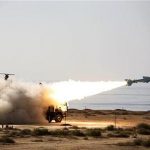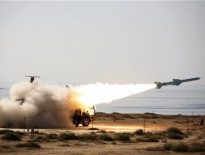(Reuters) – Voters in Ghana waited for hours in long lines to vote on Friday in elections troubled by delays and logistical problems, but which many hoped would entrench the country’s reputation as a model African democracy.

The country’s three decades of peace and a recent oil-driven economic boom have set Ghana apart in West Africa, a region better known for civil wars, coups and corruption.
“I am voting for peace, unity and development,” said Michael Akpabli, a 61-year-old man recovering from a broken hip, in a line of people clutching their voting cards at a polling station in the sprawling seaside capital Accra.
“I am voting for someone who will be able to translate our dreams into reality,” he said.
President John Dramani Mahama – who replaced the late John Atta Mills after his death from an illness in July – faces rival Nana Akufo-Addo of the New Patriotic Party (NPP), who has vowed to provide free education and root out corruption.
Opinion polls point to a tight race, raising the prospect of a repeat of the near-deadlock of the 2008 elections, in which Mills defeated Akufo-Addo in a run-off with a margin of less than 1 percent.
Results are expected within two days of polls closing. A second round will be held in three weeks if no one wins a majority of the vote on Friday.
The start of voting was delayed in some polling stations in Accra due to a lack of ballots and ballot boxes, and observers said there were numerous reports of newly introduced electronic fingerprint readers – used to verify voter identities – failing.
FIVE-HOUR WAIT
At a polling station on the outskirts of Accra, election workers were struggling to fix a malfunctioning fingerprint machine they said had stopped working nearly an hour before.
“We have been standing here for five hours. Our line is not moving,” said Alice Hayford, a 44-year-old market trader.
Election Commissioner Kwadwo Afari-Gyan told Reuters election workers were being instructed to keep polling stations open until all ballots were cast.
“If small numbers of people have not finished voting, we will keep polling stations open into the night until they are finished. But if the numbers are too big, we will need to close the polling stations and reopen tomorrow,” he said.
President Mahama, voting in his home town of Bole in northern Ghana, said that, despite the delays, the election was on course to solidify the country’s democratic advances.
“It looks like there have been a few hitches, but they seem isolated,” he said after casting his ballot.
“This election is going to consolidate Ghana’s democratic credentials once and for all. After we go through this, I believe there will be no doubt, no questions, about the fact that Ghana is a leading democracy in Africa.”
Voters will also elect a parliament, where Mahama’s National Democratic Congress (NDC) has enjoyed a slim majority.
After casting his ballot in his native Kyebi, in Ghana’s east, Akufo-Addo said the outcome of the vote was “in the hands of the Ghanaian people”, adding he had seen no signs of fraud.
OIL HOPES
Ghana has had five peaceful and constitutional transfers of power since its last coup in 1981, in stark contrast to the turmoil that surrounds it in the region.
Neighboring Ivory Coast tipped into civil war last year after a disputed 2010 poll, and regional neighbors Mali and Guinea-Bissau have both been stricken by coups this year.
While economic woes grip Europe and the United States, Ghana, also a major cocoa and gold producer, is expected to post economic growth of about 8 percent next year and is increasingly praised by investment bankers and fund managers.
“These elections are important not just to Ghana, but for the growing number of states and actors seeking to benefit from increasing confidence in Africa,” said Alex Vines, Africa Research Director at Chatham House.
Across the capital Accra, evidence of the resource wealth abounds – brightly lit multi-storey buildings, cranes looming over new construction sites, well-paved roads, and billboards advertising banks, cars and mobile phones.
But many Ghanaians have been left out. An influx of people from rural parts of the country, hoping for jobs in the capital, has created a sprawl of outlying shanty towns and swelled the ranks of the homeless on the city’s streets.
Akufo-Addo, a trained lawyer and son of a former Ghanaian president, has criticized the ruling party for the slow pace of job creation and the fight against poverty, and says he would use oil money to pay for free primary and secondary education.
Mahama, meanwhile, says he aims to boost Ghana’s per capita annual income to $2,300 by 2017 – double that in 2009.
But in a country where campaign messages rarely influence voting choices, many believe most of the 14 million voters will cast their ballots based on ethnic, social or regional ties.
(Additional reporting by Christian Akorlie; Writing by Richard Valdmanis; Editing by David Lewis and Pravin Char)





